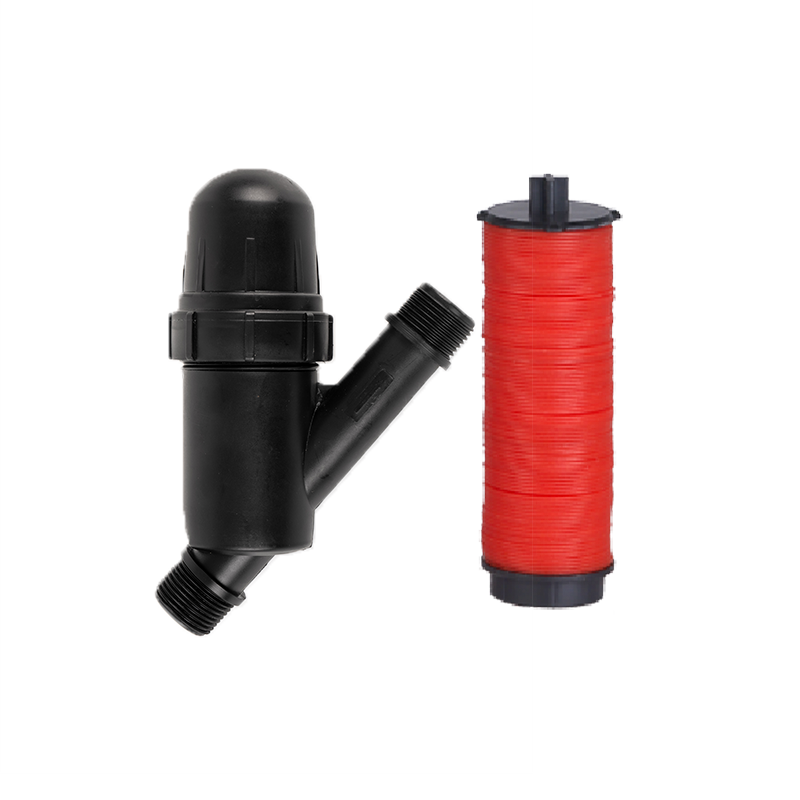 By Admin
By Admin The impact of a garden irrigation filter on water pressure and flow rate depends on several factors:
Filtration Efficiency: Filtration efficiency is paramount in determining the quality of water delivered to your garden. Filters with higher efficiency boast the ability to capture a wider range of contaminants, including sediment, debris, organic matter, and even microscopic particles. However, this increased filtration capability often comes at a cost—higher pressure drop. Pressure drop refers to the decrease in water pressure as it passes through the filter due to the resistance encountered. This phenomenon is directly related to the filter's pore size and material. Finer mesh or smaller pore sizes result in greater resistance to flow, leading to a more significant pressure drop. Consequently, achieving the desired filtration efficiency while minimizing pressure drop requires careful selection of the filter media and design.
Filter Design: The design intricacies of garden irrigation filters significantly influence their impact on water pressure and flow rate. We employ various engineering strategies to strike a delicate balance between effective filtration and minimal pressure drop. This involves optimizing the geometry of the filter housing to promote efficient flow distribution and reducing flow path restrictions. The selection of materials for the filter media is critical. Porous materials with uniform pore size distribution offer superior filtration performance, while innovative designs incorporate pleating or corrugation to maximize filtration surface area within a compact footprint. Features such as backwash capabilities or self-cleaning mechanisms enhance longevity and maintain optimal performance over time.
Filter Condition: The condition of the garden irrigation filter directly influences its ability to maintain water pressure and flow rate within the irrigation system. As the filter accumulates contaminants over time, its effectiveness diminishes, resulting in increased pressure drop and reduced flow. Regular maintenance protocols are essential to mitigate these effects. This may involve periodic inspection and cleaning of the filter cartridge or screen to remove accumulated debris and restore optimal filtration efficiency. Proactive measures such as installing pressure gauges or flow meters allow users to monitor system performance and identify potential issues before they escalate. By implementing a comprehensive maintenance regimen, users can ensure consistent water delivery to their garden while prolonging the lifespan of the filter.
System Compatibility: Achieving seamless integration between the garden irrigation filter and the existing irrigation system is imperative to minimize disruptions and optimize performance. Compatibility considerations encompass various factors, including flow capacity, inlet/outlet connection size, and pressure rating. Mismatched components can result in flow restrictions, pressure imbalances, or even system failures. Therefore, thorough assessment of system requirements and careful selection of compatible filter components are essential steps in the installation process. Incorporating bypass or bypass valves allows users to divert water flow temporarily in case of filter maintenance or replacement, ensuring uninterrupted operation of the irrigation system.
Water Source: The characteristics of the water source significantly influence the filtration requirements and subsequent impact on water pressure and flow rate. Water from different sources may exhibit varying levels of turbidity, sediment load, dissolved minerals, or organic matter. Understanding these properties is essential in selecting an appropriate filtration solution. For instance, water sources with high sediment concentrations necessitate robust filtration mechanisms capable of trapping fine particles without compromising flow rate. Conversely, water containing dissolved minerals or contaminants may require specialized filtration technologies such as activated carbon or reverse osmosis to achieve desired water quality standards.
YR9401B BSP1" y disc filter